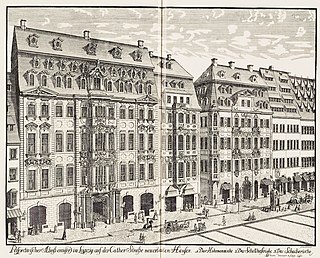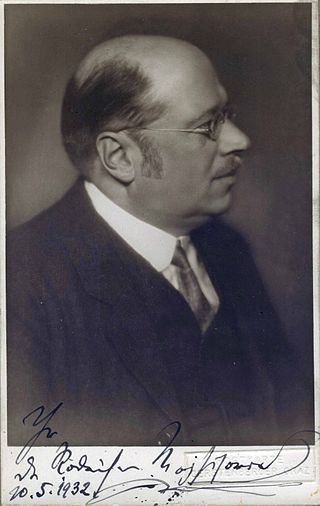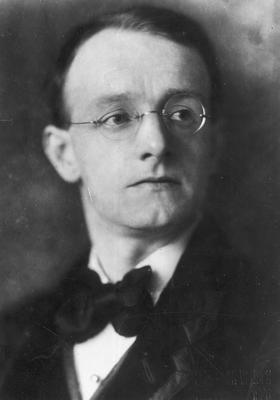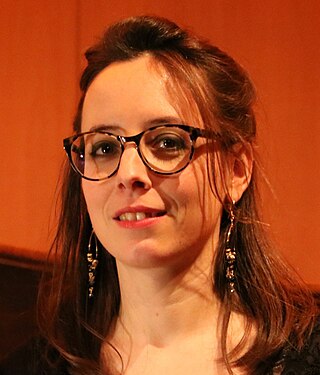Related Research Articles
A concerto is, from the late Baroque era, mostly understood as an instrumental composition, written for one or more soloists accompanied by an orchestra or other ensemble. The typical three-movement structure, a slow movement preceded and followed by fast movements, became a standard from the early 18th century.

The Brandenburg Concertos by Johann Sebastian Bach are a collection of six instrumental works presented by Bach to Christian Ludwig, Margrave of Brandenburg-Schwedt, in 1721. The original French title is Six Concerts Avec plusieurs instruments, meaning "Six Concertos for several instruments". Some of the pieces feature several solo instruments in combination. They are widely regarded as some of the greatest orchestral compositions of the Baroque era.

Trevor David Pinnock is a British harpsichordist and conductor.

Masaaki Suzuki is a Japanese organist, harpsichordist, conductor, and the founder and music director of the Bach Collegium Japan. With this ensemble he is recording the complete choral works of Johann Sebastian Bach for the Swedish label BIS Records, for which he is also recording Bach's concertos, orchestral suites, and solo works for harpsichord and organ. He is also an artist-in-residence at Yale University and the principal guest conductor of its Schola Cantorum, and has conducted orchestras and choruses around the world.
Wolfgang Friedrich Rübsam is a German-American organist, pianist, composer and pedagogue.
The keyboard concertos, BWV 1052–1065, are concertos for harpsichord, strings and continuo by Johann Sebastian Bach. There are seven complete concertos for a single harpsichord, three concertos for two harpsichords, two concertos for three harpsichords, and one concerto for four harpsichords. Two other concertos include solo harpsichord parts: the concerto BWV 1044, which has solo parts for harpsichord, violin and flute, and Brandenburg Concerto No. 5 in D major, with the same scoring. In addition, there is a nine-bar concerto fragment for harpsichord which adds an oboe to the strings and continuo.
The Diapason d'Or is a recommendation of outstanding (mostly) classical music recordings given by reviewers of Diapason magazine in France, broadly equivalent to "Editor's Choice", "Disc of the Month" in the British Gramophone magazine.
The International Johann Sebastian Bach Competition is a music competition in Leipzig, Germany, held by the Bach-Archiv Leipzig. It was founded in 1950 and was held every four years from 1964 to 1996 with five subjects and is now held every two years with three changing subjects violin / baroque violin, piano, harpsichord or in the fields of voice, cello / baroque violoncello and organ. From 1965 the competition is a member of the World Federation of International Music Competitions in Geneva.
Adriana Hölszky is a Romanian-born German music educator, composer and pianist who has been living in Germany since 1976.
The MA Festival Brugge, short for the festival Musica Antiqua Bruges in Bruges, Belgium, is a festival of early music and historically informed performances, started in 1960. The program includes concerts, master classes, conferences, visits in the region, exhibitions, instrument market, and international competitions that concentrates in a three-year cycle on organ, harpsichord, pianoforte and other period instruments, vocals, and baroque ensembles. The specialised festival is part of the Festival of Flanders.

The Sonata in G major for two flutes and basso continuo, BWV 1039, is a trio sonata by Johann Sebastian Bach. It is a version, for a different instrumentation, of the Gamba Sonata, BWV 1027. The first, second and fourth movement of these sonatas also exist as a trio sonata for organ.

Roderich Mojsisovics von Mojsvár was an Austrian composer based in Graz, head of the Schule des Musikvereins für Steiermark there.

Fidelio Friedrich "Fritz" Finke was a Bohemian-German composer.
The Harpsichord Concerto in D minor, BWV 1052, is a concerto for harpsichord and Baroque string orchestra by Johann Sebastian Bach. In three movements, marked Allegro, Adagio and Allegro, it is the first of Bach's harpsichord concertos, BWV 1052–1065.

Maude Gratton is a French classical musician. She is pursuing a career of soloist, mastering the pipe organ, the piano-forte and the harpsichord.
Lost versions of compositions by Johann Sebastian Bach can be reconstructed on the basis of extant versions of similar music. Reasons for such reconstructions include extension of the repertoire and testing hypotheses about the genesis history of known pieces. For instance, in the late 19th century it was discovered that Bach likely transcribed his Concerto for two harpsichords in C minor, BWV 1060, from a lost earlier version for violin and oboe. Reconstructions of BWV 1060 to its presumed original version, published from the 1920s, extended the Bach repertoire for oboists.
References
- ↑ "Die Teilnehmer des Bach-Wettbewerbs 2014". Bach Archiv Leipzig. Archived from the original on 8 August 2014.
{{cite web}}: CS1 maint: bot: original URL status unknown (link) - ↑ "The Prize Winners of the Bach Competition 2016". Bach Archiv Leipzig. Archived from the original on 28 April 2018. Retrieved 27 April 2018.
- ↑ "Preisträger im Internationalen Bach-Wettbewerb geehrt". Leipziger Volkszeitung (in German). 21 July 2018. Retrieved 23 July 2018.